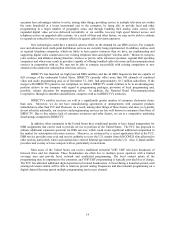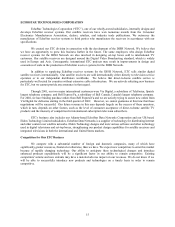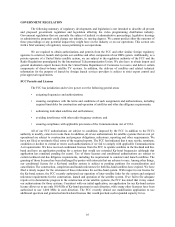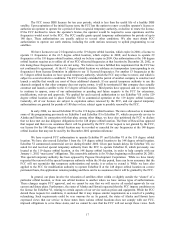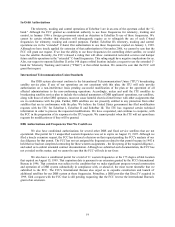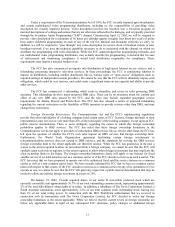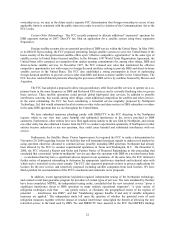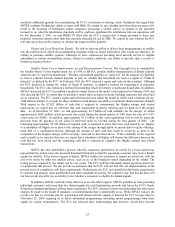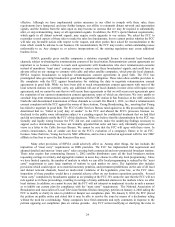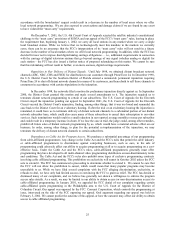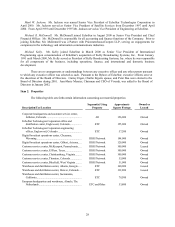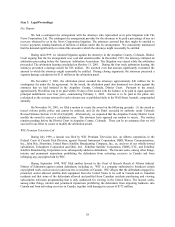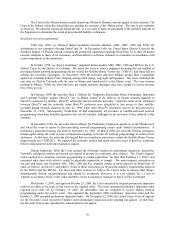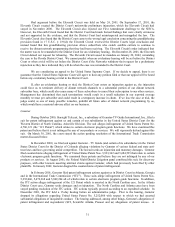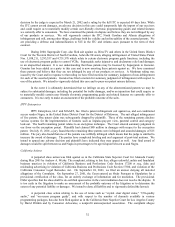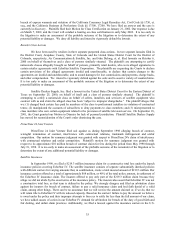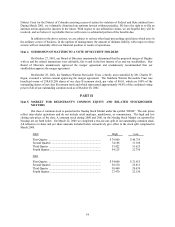Dish Network 2001 Annual Report Download - page 26
Download and view the complete annual report
Please find page 26 of the 2001 Dish Network annual report below. You can navigate through the pages in the report by either clicking on the pages listed below, or by using the keyword search tool below to find specific information within the annual report.24
effective. Although we have implemented certain measures in our effort to comply with these rules, these
requirements have hampered, and may further hamper, our ability to retransmit distant network and superstation
signals, and the burdens from the rules upon us may become so onerous that we may be required to substantially
alter, or stop retransmitting, many or all superstation signals. In addition, the FCC’s sports blackout requirements,
which apply to all distant network signals, may require costly upgrades to our system. We asked the FCC to
reconsider several aspects of these rules to make the rules less burdensome, but we cannot predict whether the FCC
will take any favorable action with respect to the request, and other parties have asked for reconsideration to the
rules which would be adverse to our business. On reconsideration, the FCC may resolve certain outstanding issues
unfavorably to us. Any changes to, or adverse interpretations of, the existing regulations may create additional
burdens for us.
SHVIA generally gives satellite companies a statutory copyright license to retransmit local broadcast
channels, subject to obtaining the retransmission consent of the local station. Retransmission consent agreements are
important to us because a failure to reach such agreements with broadcasters who elect retransmission consents
instead of mandatory “must carry” carriage means we cannot carry these broadcasters’ signals, and could have an
adverse effect on our strategy to compete with cable and other satellite companies, which provide local channels.
SHVIA requires broadcasters to negotiate retransmission consent agreements in good faith. The FCC has
promulgated rules governing broadcasters’ good faith negotiation obligation. These rules allow satellite providers to
file complaints with the FCC against broadcasters for violating the duty to negotiate retransmission consent
agreements in good faith. While we have been able to reach retransmission consent agreements with most of the
local network stations we currently carry, any additional roll-out of local channels in more cities will require more
agreements, and we cannot be sure that we will secure these agreements or that we will secure new agreements upon
the expiration of our current retransmission consent agreements, some of which are short term. We were unable to
conclude long-term retransmission consent agreements with the NBC station in San Francisco or the ABC station in
Nashville and discontinued transmission of those channels as a result. On March 1, 2001, we filed a retransmission
consent complaint with the FCC against the owner of these stations, Young Broadcasting, Inc., asserting that Young
has failed to negotiate in good faith. The FCC’s Cable Services Bureau ruled against us in this proceeding and also
determined that we “failed in [our] duty of candor” to the FCC and abused the FCC’s processes because we
disclosed to the public some information subject to a pending request for confidential treatment that we had filed
and did not immediately notify the FCC of this disclosure. While we believe that this determination by the FCC was
factually and legally wrong because the FCC did not, and could not, make the underlying findings necessary to
support such a determination, we have not formally appealed that order and have only informally expressed our
views in a letter to the Cable Services Bureau. We cannot be sure that the FCC will agree with these views. In
certain circumstances, lack of candor can bear on the FCC’s evaluation of a company’s fitness to be an FCC
licensee. Since that time, Young has lost its NBC affiliation, and we have reached an agreement with the new NBC
affiliate in San Jose to serve the San Francisco Bay area.
Many other provisions of SHVIA could adversely affect us. Among other things, the law includes the
imposition of “must carry” requirements on DBS providers. The FCC has implemented that requirement and
adopted detailed and onerous “must carry” rules covering both commercial and non-commercial broadcast stations.
These rules require that commencing January 1, 2002 satellite distributors carry all the local broadcast stations
requesting carriage in a timely and appropriate manner in areas they choose to offer any local programming. Since
we have limited capacity, the number of markets in which we can offer local programming is reduced by the “must
carry” requirement to carry large numbers of stations in each market we serve. The legislation also includes
provisions which could expose us to material monetary penalties, and permanent prohibitions on the sale of all local
and distant network channels, based on inadvertent violations of the legislation, prior law, or the FCC rules.
Imposition of these penalties would have a material adverse effect on our business operations generally. Several
“must carry” complaints by broadcasters against us are pending at the FCC. We cannot be sure that the FCC will not
rule against us in those proceedings, resulting in carriage of many additional stations in the markets where we offer
local stations. In addition, we cannot be sure that the FCC will not interpret or implement its rules in such a manner
as to inhibit our current plan for compliance with the “must carry” requirements. The National Association of
Broadcasters and Association of Local Television Stations filed an emergency petition on January 4, 2002 asking the
FCC to modify or clarify its rules to prohibit or hamper our compliance plan. On January 8, 2002, the FCC placed
the petition on public notice and stated that it may be able to resolve the issue by means of a declaratory ruling
without the need for a rulemaking. Many companies have filed comments and reply comments in response to the
petition opposing our compliance plan on various grounds. Any FCC action modifying or clarifying the rules in


